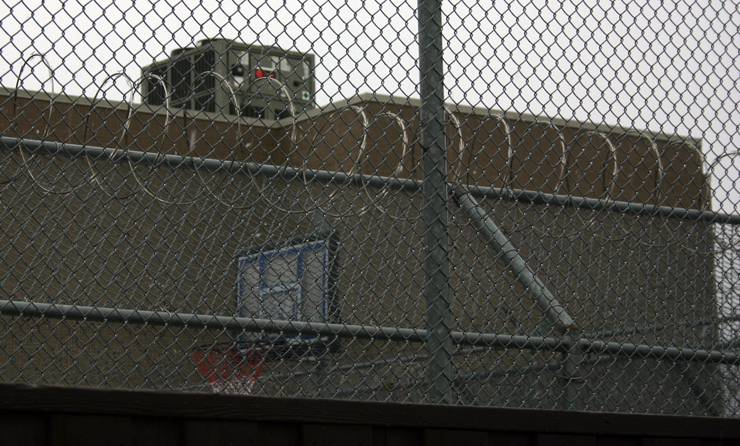TORONTO — A rare court hearing for a mentally ill Jamaican man who’s been in prison for five years without charge began Tuesday as activists called on the Liberal government to overhaul an immigration system that can lead to indefinite detention.

At the hearing, Alvin Brown, 40, called for his release so he can access proper treatment for his schizophrenia and depression. The long incarceration, including stints in solitary confinement, has taken its toll on his mental health, especially because the prospects of freedom are so uncertain, he said.
“I think that I’ll never get out of jail,” Brown testified. “It’s been five years now. There’s been no progress.”
READ MORE: Feds to ‘dramatically reduce’ jailing of immigration detainees: Goodale
Although he became a permanent resident, the government deemed Brown inadmissible after 17 criminal convictions, most for drugs or weapons offences. He served his time – the longest sentence was 14 months – but has been in immigration detention since Sept. 2011, because of his inability to obtain travel documents.
Activists say indefinite detention violates international law. Fifteen people are known to have died in Canadian immigration custody since 2000, three since the Liberal government came to office last October.
“This is a crisis,” Syed Hussan, of the watchdog group End Immigration Detention Network, said before the hearing. “We’re waiting for the federal government to do what it promised, which is to bring real change.”
READ MORE: Immigration detainee’s mysterious death is the second in seven days
Hussan also called on the Ontario government to stop doing Canada Border Services Agency’s “dirty work” by allowing its jails to be used for immigration purposes.
- Pedestrian in life-threatening condition after being hit by vehicle in Mississauga
- Ontario transportation minister pitches 24-hour work to speed up Gardiner construction
- Judge at trial of man accused of killing cop was concerned over Crown changing theory
- Pop-ups and ‘passion meter’: What’s new this year as Leafs, Bruins square off
A spokesman for Public Safety Minister Ralph Goodale said Tuesday cases of long-term jailing involve a “very small number” of people, but authorities need the detention option.
“Minister Goodale is committed to a better, fairer immigration detention system for the humane and dignified treatment of individuals,” Scott Bardsley said in an email.
READ MORE: Immigration detainees on hunger strike, request meeting with public safety minister
“(He) recently announced up to $138 million to transform the immigration detention system in Canada, including the expansion of alternatives to reduce the use of detention.”
While such matters are normally the purview of immigration authorities or Federal Court, Ontario’s top court ruled last year that provincial courts have jurisdiction over detention challenges.
The hearing before Justice Alfred O’Marra got underway with a federal government lawyer saying Brown was now due to be sent back to Jamaica on Sept. 7.
READ MORE: Goodale shows no sign of meeting demands of hunger-striking immigration detainees
“The issuance of that document is imminent,” Martin Anderson told court. “His removal will proceed as scheduled.”
Brown and his lawyers were skeptical, noting Jamaica has failed in the past to give him travel documents, including this past January when he was told he was about to be deported.
Brown recalled an immigration removals officer telling him in 2011 he was going to be in jail “a very long time.” While immigration detentions are reviewed every 30 days – a rubber stamp, activists say – Brown said he stopped attending because there was no point.
READ MORE: Detainees’ hunger strike in Lindsay, Ont., jail down to two holdouts, officials say
“Frustrated. Stressed out,” he testified. “They just keep saying the same things every month.”
Brown, who said he came to Canada when he was six or seven years old, testified he would be happy to go back to Jamaica even though he knows no one there and has few immediate prospects.
“I feel good about it,” he told court. “I’ll be free.”
Testifying for Brown, Janet Cleveland, a clinical psychologist, said the uncertainty around long-term detentions makes it a high stress situation. Brown, she said, was receiving inadequate treatment for his condition.
READ MORE: Lack of interest stalls new immigration detention plan
“It seems to me to be certainly suboptimal,” Cleveland said. “There doesn’t even appear to have been good monitoring of medication.”
Activists estimate between 400 and 600 foreigners are in Canadian immigration custody on any given day. Many have spent months or years behind bars because they can’t be deported and Ottawa contends they are a flight or security risk.
Immigration consultant MacDonald Scott said outside court that most of them should be allowed to contribute to the community.
“If you can’t remove them, release them,” Scott said.
Brown’s hearing at which the federal government will have to justify his continued detention, is believed to be only the second case to find itself in Superior Court.



Comments